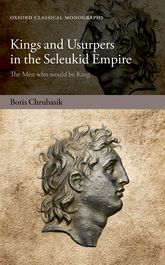How does one become king? This book investigates the question of kingship in the Seleukid empire, the largest of the kingdoms that arose after the death of Alexander the Great. More specifically, this book examines the role of usurpers in this particular kingdom, individuals who attempted to be king, and who were labelled as rebels by ancient authors after their demise. Through a careful analysis of the literary, numismatic, and epigraphic material, this study places these individuals in their appropriate historical contexts, and thus creates an image of the political landscape of the Seleukid empire in the third and second centuries BCE; an image where kings, usurpers, and other groups within the empire were in constant competition about their superior position within the state, attempting to persuade cities, armies, and other groups that they were the most successful, most persuasive, and therefore the only real option for kingship. This book is on the one hand a new, and carefully argued political history of the Seleukid empire. Beyond historical narratives, however, it is also a history of social power. It re-defines the role of the Seleukid king in his own empire, and it offers new approaches to the interpretation of the relationship between the Seleukid king and the groups within the empire. By doing so, this book questions the current consensus on the Seleukid state, and argues instead that the empire was structurally weak, yet where many strong kings ruled, and where the Seleukid kings’ position always remained precarious.
Publication Type
- Book



